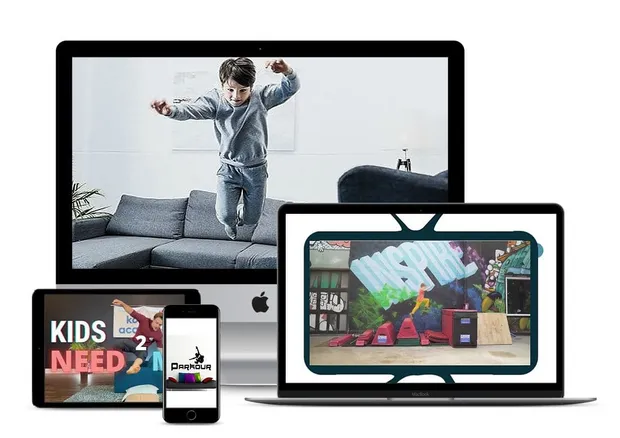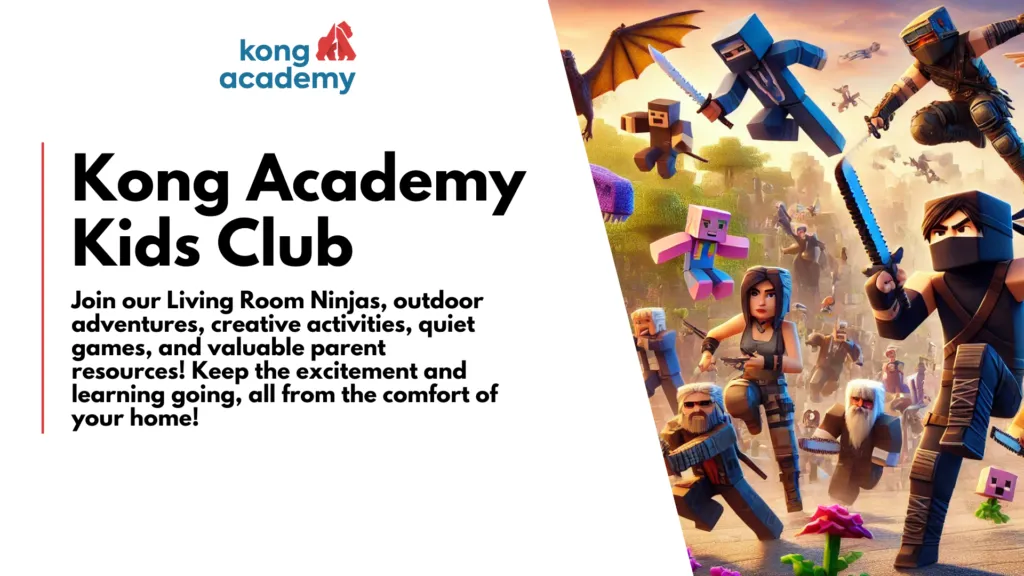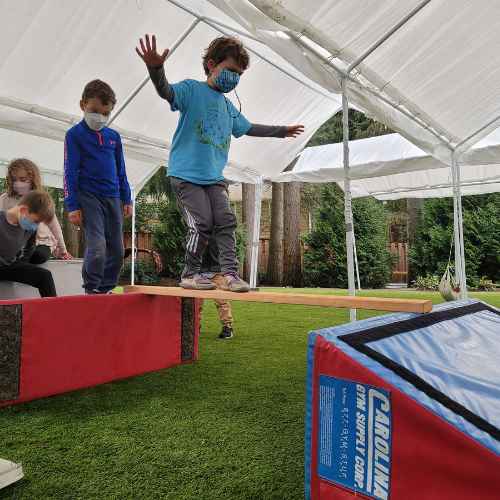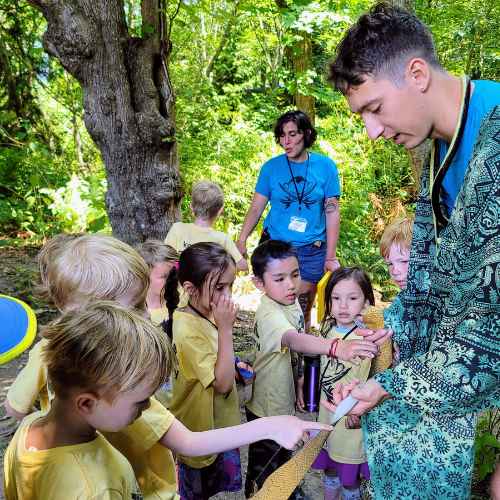
Respect is a cornerstone of positive behavior and healthy relationships, making it one of the most valuable lessons you can teach children. By learning how to respect themselves and others, kids develop crucial social skills that help them navigate challenges, build strong bonds, and create a more inclusive world.
At Kong Academy, we believe that respect is more than just a polite response. We teach and encourage our families to see respect as an attitude of kindness, empathy, and understanding that begins at home and in the classroom.
Why Learning Respect Is An Essential Life Skill
Respect is the foundation of a well-rounded individual’s character. When children learn respect, they become better equipped to handle conflicts, build stronger relationships, and contribute positively to society. These skills certainly benefit their childhood years but also shape their interactions as adults, influencing how they treat others in personal and professional spaces.
Build Strong & Meaningful Relationships with Family and Friends
Respect begins at home, where children first learn to interact with family members. When parents emphasize respectful communication—such as listening without interrupting or valuing each person’s opinion—children internalize these behaviors and mirror them in their friendships. For instance, a child who practices respect is more likely to resolve disputes through dialogue instead of arguments.
Respect encourages reciprocity. When children show respect to others, they’re more likely to receive it in return, creating a cycle of mutual trust and understanding. For example, saying “please” and “thank you” not only improves their interpersonal interactions but also fosters goodwill in their social circles. Over time, these habits become second nature, laying the groundwork for healthy, respectful relationships.
Helps Navigate Social Situations
Respect is a vital tool for navigating various social settings, from the playground to the classroom. Children who understand the importance of respect are better equipped to handle group dynamics, follow instructions, and work collaboratively with peers. For instance, a child who respects their teacher is more likely to pay attention in class and complete assignments on time, creating a positive learning environment. They will also treat the other school staff kindly, regardless of their position.
In unfamiliar settings, respect acts as a bridge. When children meet new people or encounter different cultural practices, respect helps them approach these situations with an open mind and a willingness to learn. This adaptability boosts their confidence and allows them to thrive in diverse environments, preparing them for future challenges like entering the workforce or engaging with global communities.
Encourages Empathy & Understanding of Others
Respect and empathy go hand in hand. Teaching children to respect others involves helping them understand and value perspectives different from their own. For instance, encouraging kids to imagine how someone else might feel in a given situation nurtures their emotional intelligence and ability to connect with others on a deeper level.
This skill is particularly important in a world that’s increasingly diverse. When children learn to appreciate differences in opinions, backgrounds, and lifestyles, they’re less likely to judge others unfairly. Instead, they will approach interactions with curiosity and compassion, creating more inclusive communities. This empathetic mindset can also help reduce bullying and discrimination, as children who respect others are more likely to stand up for their peers.
How Kids Can Start Learning Respect
Teaching respect is a continuous process that requires intentional guidance and reinforcement. By breaking down respect into actionable steps, parents and teachers can help children understand and practice it in their daily lives.
Understanding the Concept of Respect
For many children, respect begins with the golden rule: “Treat others the way you want to be treated.” This simple yet powerful principle helps children recognize the impact of their actions and words on others. For example, asking them how they’d feel if someone ignored their opinion can help them understand why it’s important to listen attentively.
Books, movies, and role-playing exercises are also excellent tools for teaching respect. For instance, reading a story about a character who learns to appreciate others’ differences can spark meaningful conversations about inclusion and kindness. Role-playing scenarios, such as pretending to be a customer and a cashier, allow children to practice respectful behaviors in a fun and engaging way.
Different Is Okay
Children often encounter differences, whether in cultural traditions, physical appearances, or personal preferences. Teaching them that these differences are not just okay but valuable helps build a more accepting mindset. Parents can introduce children to various cuisines, festivals, music, or languages, explaining how these unique elements enrich the world.
Discussions about fairness and inclusion can also help. For instance, if a child notices someone being excluded from a game, use the opportunity to discuss how everyone deserves respect, regardless of their abilities, interests, or cultural backgrounds. These conversations encourage children to embrace diversity and treat others with kindness, even when they don’t fully understand their perspective.
Be Polite
Politeness is a fundamental aspect of respect that children can start practicing early. Simple actions, like saying “please” when asking for something or “thank you” when receiving help, teach children the importance of acknowledging others’ efforts. Over time, these small acts of courtesy become habits that shape how they interact with others.
Parents and teachers can reinforce politeness through praise and encouragement. For example, if a child says “excuse me” before interrupting, acknowledge their effort to be respectful. Celebrating these moments not only boosts the child’s confidence but also motivates them to continue practicing respectful behaviors in different settings.
How Parents & Teachers Can Model Respect
Children are keen observers, often mimicking the behaviors they see in adults. Regardless of different parenting styles, parents can instill respectfulness by modeling respect. Teachers, too, play a crucial role in demonstrating respect through their actions and words.
Speaking Kindly
The language adults use sets the tone for how children communicate. For example, addressing children calmly and respectfully, even when they make mistakes, teaches them that it’s possible to correct behavior without being harsh. Phrases like “Let’s try this again” or “How can we fix this together?” model constructive and respectful communication.
Additionally, how adults speak to others—whether it’s a waiter, a neighbor, or a colleague—reinforces the importance of treating everyone with dignity. These everyday interactions serve as powerful examples of how respect creates positive and cooperative relationships.
Active Listening
One of the simplest ways to show respect is by listening attentively. When parents and teachers give children their full attention, they convey that the child’s thoughts and feelings matter. For example, kneeling down to a child’s level during a conversation shows engagement and empathy, making the child feel valued.
Active listening also involves asking thoughtful questions and responding genuinely. For instance, if a child is upset about a disagreement with a friend, take the time to understand their perspective instead of offering quick solutions. This approach not only strengthens your bond with the child but also teaches them to listen and respond respectfully in their own interactions.
Demonstrating Empathy
Empathy is the foundation of respect, and adults can model it through small but impactful gestures. For example, acknowledging a child’s frustration during a challenging task and offering encouragement shows understanding and support. Similarly, discussing how others might feel in specific situations—such as being left out of a game—helps children develop a more compassionate mindset.
By consistently modeling empathy, parents and teachers create a nurturing environment of reciprocal respect where kindness thrives. This not only benefits children’s immediate relationships but also shapes how they approach others throughout their lives.
Activities To Start Building Respectful Habits
Practical activities provide children with opportunities to apply what they’ve learned about respect in meaningful ways. These hands-on experiences make abstract concepts more tangible and enjoyable.
The Respect Jar
The Respect Jar is an engaging activity that encourages children to recognize and celebrate respectful actions. Each time a child demonstrates respect—such as sharing a toy or helping a sibling—write it down on a slip of paper and place it in the jar. At the end of the week, review the notes together and discuss the positive impact of these actions.
This activity not only reinforces respectful behavior but also helps children see the cumulative effect of small acts of kindness. Over time, it fosters a sense of pride and motivation to continue practicing respect in their daily lives.
Team Sports
Team sports are an excellent way to teach respect through collaboration. Whether it’s soccer, basketball, or volleyball, children learn to listen to their teammates, follow rules, and celebrate group achievements. For example, respecting the coach’s instructions or supporting a teammate during a game teaches children the value of cooperation and mutual respect.
These lessons extend beyond the field, helping children develop skills like teamwork and communication that are essential in every aspect of life. They also learn to handle competition gracefully, respecting opponents regardless of the outcome.
Group Projects
Group projects encourage children to practice respect in collaborative settings. Assigning specific roles—such as a leader, note-taker, or timekeeper—ensures that everyone’s contributions are valued and appreciated. For example, if one child excels at drawing, they might take the lead in creating visuals for a project, while another focuses on research.
By working together, children learn to respect each other’s strengths and communicate effectively, reinforcing the importance of teamwork and shared responsibility. These experiences prepare them for future collaborative environments, such as school projects or workplace teams.
If you are confused as to how to teach respect to your child, know that it is an ongoing process that requires consistent effort and modeling. At Kong Academy, we specialize in programs designed to empower kids with the tools they need to grow emotionally and socially. Visit Kong Academy today and take the first step in building a brighter, emotionally balanced future for your child!
By helping them understand what respect looks like, encouraging polite behavior, and leading by example, you’re giving your children the tools to build strong relationships and navigate life with empathy and kindness.
As you foster respect in your child, the next step is to teach communication skills—another cornerstone of healthy relationships and positive behavior. These skills will empower your child to express themselves effectively while valuing others’ perspectives.
If you’re in the Seattle metro, we offer summer camps and after school programs designed to empower kids and infuse their sense of independence. Contact us today to learn more.
GET Access to the ULTIMATE PLAY DATE PACKAGE (Value: $49) for FREE!


7-Day Crystal Shard Adventure
Unleash your child’s potential with our 7-day crystal shard movement adventure!




